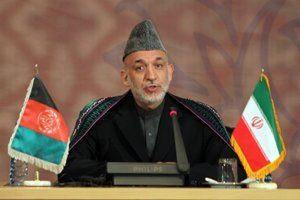
Afghan President Hamid Karzai failed to give the American Embassy in Kabul advance notice that he was about to issue an edict ordering private security companies operating in Afghanistan to fold up shop within four months. Two senior U.S. officials, who asked for anonymity when discussing sensitive information, tell Declassified that embassy officials had been talking for months with Karzai about what his government could do to clean up corruption problems involving such contractors, particularly contractors operating in the south of the country, whose important duties include providing security for official and private supply convoys. But the officials say that Karzai gave no advance notice to the embassy or other U.S. officials that he would attempt to address the problem with the radical step of trying to outlaw such contractors with the stroke of a pen.
The U.S. officials say that while the Obama administration is willing, if not keen, to work with Karzai to improve regulation or supervision of security contractors—and even to force bad ones out of business—setting a four-month deadline is impractical. If this deadline is enforced, the officials warn, it could cause chaos and put lives of both American officials and nongovernment relief workers in jeopardy.
One of the officials says that whatever happens, the U.S. has no intention of shutting down the operations of contract security personnel who provide critical guard services at the American Embassy in Kabul, operations the U.S. believes have to remain in the hands of private contractors to free up U.S. military personnel for more complex missions elsewhere. The other official notes that because the embassy grounds are technically U.S. territory under international diplomatic law, Karzai's government has no authority to tell Americans how to handle their security needs. One official also says there is no indication that Karzai plans to dismiss the private security contractors—presumably top-class international mercenaries—whom he employs to protect himself.
In fact, U.S. officials say, the edict on the contractors may well be just another manifestation of Karzai's mercurial personality, and may be an attempt to distract attention, both internationally and within Afghanistan, from issues that are potentially embarrassing to him, such as the pressure he has been putting on Western-supported anticorruption units that have been investigating one of his aides.
The two U.S. officials say they believe that the reason for Karzai's proclamation may have been an incident late last month in which five Afghans were reported to have been killed when an American Embassy vehicle carrying security contractors working for the U.S. security company DynCorp crashed into another vehicle on the road between the embassy and Kabul airport. The crash provoked noisy demonstrations near the American Embassy. An investigation by Afghan police later found that the embassy vehicle was not at fault for causing the accident. But U.S. officials believe Karzai seized on the incident anyway as a pretext for issuing his order to ban contractors.
The Obama administration's immediate plan appears to be to try to persuade Karzai to, at the very least, postpone the effective date of his decree. Public comments by administration officials have been cautious, however. When State Department spokesman P. J. Crowley was asked about the four-month deadline at his public briefing on Monday, he said, "I can't comment on the four-month deadline. I haven't seen that particular aspect. I think we rely on security contractors, and we'll work with the government of Afghanistan on a realistic approach going forward." After the edict was officially made public on Tuesday, a senior administration official told Declassified, "We'll sort through this and see exactly what he wants to do."
U.S. officials believe that one aspect of private security-contractor operations in Afghanistan for which reform is overdue is the use of such contractors—and subcontractors and sub-subcontractors—to protect supply convoys moving through dangerous areas of the countryside. A recent investigation by a House subcommittee led by Rep. John Tierney, a Massachusetts Democrat, alleged that a major Pentagon contract for private security protection of U.S. supply convoys was so extensively subcontracted to dubious characters, including "warlords, strongmen, commanders, and militia leaders who compete with the Afghan central government for power and authority," that U.S. tax dollars are fueling "warlordism, extortion, and corruption" and could even provide "a significant source of funding for insurgents." But whether Karzai can be persuaded to take a more nuanced approach to a solution remains to be seen.
Uncommon Knowledge
Newsweek is committed to challenging conventional wisdom and finding connections in the search for common ground.
Newsweek is committed to challenging conventional wisdom and finding connections in the search for common ground.





